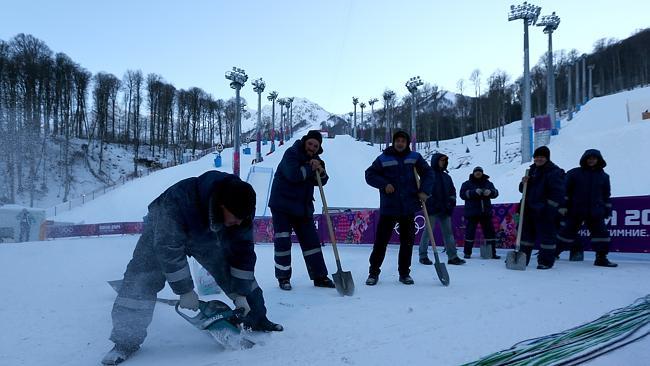Sochi races to be ready for Putin's $56bn gamble
UNDER a cloudless blue sky, a skier in a red training jacket hurtled backwards down one of the Olympic slopes towards a ramp guarded by a giant Russian doll.

UNDER a cloudless blue sky, a skier in a red training jacket hurtled backwards down one of the Olympic slopes towards a ramp guarded by a giant Russian doll.
Disaster, or at the very least spectacular embarrassment, looked unavoidable, but at the last moment he swivelled 180 degrees and soared into the void.
Helicopters circled above him, dogs barked and after several leisurely airborne twists he landed safely and raced down to the finish line of the Rosa Khutor Extreme Park course, where the first sporting event of the XXII Olympic Winter Games begins today, a day before the Opening Ceremony.
As hosts, Russia and President Putin are also attempting something that, to most observers, looks immensely risky, wildly ambitious and probably unwise. The difference is that, unlike the skier, they haven't done it before. No one has, on this scale.
At 31 billion pounds ($56bn), this will be the most expensive Olympics ever staged, outstripping Beijing, and three times the budget of London 2012.
Mr Putin said yesterday that "Russia is ready to hold the Olympics" - but it does not look that way, either on the coast or 31 miles away, in Rosa Khutor, in the mountains. The slope of the Extreme Park, for instance, was still scattered yesterday with snow-covered piles of plastic tubing, wooden boards and an uprooted tree.
One of the biggest stars in winter sports, the American Shaun White, yesterday cited safety concerns when he pulled out of the eagerly anticipated slopestyle snowboarding event.
Complaints from newly arrived visitors included hotels that were incomplete, taps flowing dirty water, and pavements missing manhole covers.
Russia won the bid for the Games in 2007, when its oil-fuelled economy was booming. Mr Putin saw it as an opportunity to erase the bad memories of the Moscow Summer Olympic of 1980, marred by an American boycott, and to showcase the glory of the modern Russian state built under his leadership.
Instead, the run up to the event has been dominated by widespread concerns. The cost has quadrupled at a time when the Russian economy is slowing. Allegations of ecological vandalism and human rights violations are rife and a global campaign has sprung up to use the event to object to Russia's new "gay propaganda" law. There are also fears of terrorist attacks spilling over from the North Caucasus, where Russia's heavy-handed approach has perpetuated rather than resolved a festering Islamist insurgency.
Sochi is surely the most scrutinised Winter Olympics since the first in 1924, and, as the opening has drawn closer, it has become increasingly obvious that facilities will not all be finished on time.
To reach Rosa Khutor, spectators will take either the new road or the new railway line up from subtropical Adler, a once unremarkable small town by the Black Sea which is now home to six gleaming new sports stadiums, Russia's largest train station - and, still, a lot of frantic building work.
The combined road and rail construction project cost 5.3bn pounds, more than the total cost of the Winter Olympics in Vancouver in 2010.
Russian Esquire magazine suggested that it would have been cheaper to pave the 31-mile route with a centimetre of black caviar, or 22cm of foie gras.
The project was overseen by Russian Railways, a state agency that employs nearly a million people and is run by Vladimir Yakunin, one of President Putin's closest associates. A fleet of 38 new trains, built by Siemens, will ferry as many as 7,000 passengers an hour between the coast and the Caucasus mountains.
Pulling out of Adler station yesterday afternoon, the "Lastochka" (Swallow) train glided silently between the airport and rows of low-rise, boxy houses, and then along the milky Mzymta River before diving into the first of many long tunnels. Climbing higher, the scale of the engineering work involved became clearer. Much of the road, which winds alongside the railway line, is built over yawning drops. Though the views into the distance were remarkable, the scene closer to the tracks was a mess of mud, gouged-out hillside, empty drainage channels and barbed wire, punctuated by pylons and military posts.
On the platform of Esto-Sadok, base camp for the ski-jumping competition, workers were hammering up signs and painting columns.
The next leg of the journey passed a gigantic, palazzo-style Marriott hotel, surrounded by diggers, with an empty swimming pool. Next door was another enormous building "Hotel Number 7", that looked equally deserted. At Krasnaya Polyana station, the end of the line, the forecourt was full of enthusiastic volunteers in brightly coloured Bosco tracksuits, but the cafe was closed.
A sweltering, 15-minute walk upriver to the main square in Rosa Khutor, ringed by Italianate hotels that are open and have guests, a crowd of several thousand gathered at 5pm to watch the Olympic torch pass through.
From here, gondolas will carry spectators up above the snowline proper, swaying over enormous chasms strewn with felled trees, and on up to the start of the men's downhill route, just below the 2,320m Rosa Peak.
With the start of competition, at least, comes a chance to dispel the pessimism that has surrounded Sochi 2014 for so long. Aleksei, from St Petersburg, who prepares the courses, said that the snow was as good if not better than that found in the best European resorts.
But he added: "I pay less money for beer there. And the hotels are ready."
The Times



